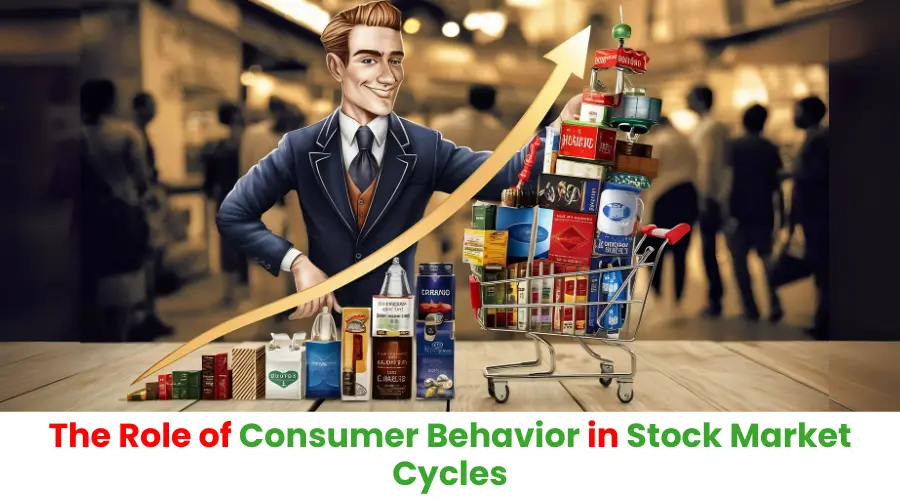The Role of Consumer Behavior in Stock Market Cycles
Introduction
The stock market is not just about figures, charts, or firms—it's largely about people,
particularly what they do and feel. Each time you come across news such as "Markets crash"
or "Sensex at record high," it's not necessarily economics, it's emotions influencing those
actions.
When individual investors are optimistic or scared, they do something about it—buy when
everyone's noisy and sell when everyone is silent. And this same cycle continues to repeat
itself.
If you're learning intelligent investing from share market classes in Hadapsar, you're aware
that this is not theory—it's real-world market action. Let's explore in detail how normal
feelings ripple through share prices.

How Consumer Sentiment Affects Market Cycles
- The Optimism Phase
This is where everybody's euphoric. Corporate profits are on the rise, employment is evident, and consumers spend money on gadgets, vacations, and homes.
When consumers are spending, revenues of FMCG, autos, banks, retail stocks increase, stock prices rise. The market rises—sometimes crazily quickly—since everybody thinks the good times go ever upwards. - The Fear Phase
Then something little shakes people up—perhaps inflation accelerates, rates increase, or international news spooks retail investors. Spending falls off. Nobody shops or dines out. Business profits stall. Investors get nervous, and the market plummets quicker than it escalated. - The Recovery Phase
When it gets too depressing, the bargain hunters move in. The consumers slowly begin spending on trivial items again. Companies stabilize and the stocks bottom out gradually. Confidence is regained, and the cycle begins again towards optimism.
Greed vs Fear: The Actual Stock Market Drivers
Throughout these cycles, two emotions hold sway:
Greed causes people to purchase overvalued stocks with a mindset of "I don't wanna
miss out."
Fear compels them to panic sell at the trough.
At every step, human sentiments override financial calculations. That's why Warren Buffett
states: even intelligent people are slaves of emotions.
Actual Indian Instances of Behaviour-Triggered Market Action
- Crash in 2008
The meltdown across the world frightened everyone so much that even Indian investors rushed out. Consumers stopped spending. Banks began to accumulate NPAs. Markets fell 60% in months.
But after a while, once the panic subsided, investors who held on (or entered) during the fear-phase saw strong long-term gains. - COVID-19 Rally
When lockdowns hit in 2020, markets saw a deep crash. But by late 2020, consumer demand for internet services and pharma surged. Companies like Zomato, Divi’s, and TCS recovered first—driven by a shift in consumer behavior (work from home, deliveries). Market recovered fast.
Important Psychological Traps That Investors Fall Into
- FOMO (Fear of Missing Out)
It's that sense of when everybody's making money and you think, "If I don't jump in now, I'll miss the boat." That's how most people invest at peaks and lose afterwards. - Herd Mentality
If everybody's selling or buying, so do you—no analysis, just going along with the crowd. That's risky. Markets bounce wildly on crowd trends. - Recency Bias
After a good several months, folks anticipate that the tide will continue indefinitely. Or after a difficult period, they expect despair to never cease. That halts intelligent decision-making.
How Consumer Spending Habits Impact Earnings
As consumers spend on dining out, cinema, vacations, or cars—that appears as profit in
company earnings. And when earnings increase quarter after quarter, stocks appreciate.
On the other hand, when consumers don't pull out—companies suffer. Profits decline, and
shares tumble. Spending behavior changes can change the fortunes of an entire industry, such
as retail, auto, banking.
How to Train Yourself to Remain Rational
- Monitor sentiment gauges such as Consumer Confidence Index or debit/credit trends.
- Use stop-loss & make decisions on facts, not feelings.
- Monitor quarterly earnings vs optimism in media hype.
- Read research, not rumors.
- Join training or groups such as a Stock market Training Institute in Hadapsar (Pune) to study why leading investors act that way.
Conclusion: What to Learn from Market Psychology
In each up-and-down cycle, it's not merely money changing—it's people changing feelings. If
you understand that, you're halfway to making intelligent investment choices.
Observe what people do—rather than corporate information. That's the way you will invest in
cycles prudently. If you prefer learning in steps, then high-grade direction at online share
market courses will really hone you against emotional traps.
Disclaimer
This site is for educational purposes only and should not be considered investment advice. Always seek the opinion of a registered financial adviser prior to making decisions. All investments involve risk. Past performance is no guarantee of future results.
FAQs
Q1: Can emotional behavior be totally eliminated in investments?
No. But with self-control and awareness, you can reduce rash decisions.
Q2: What consumer sentiment data should I monitor?
Monitor such as auto sales, FMCG volumes, SBI credit card spends, Consumer Confidence Index.
Q3: Is it always a good idea to buy the dip?
Not indiscriminately — consider why the dip occurred. If fear over fundamentals, then a buying opportunity.
Q4: How frequently should I review my emotions & portfolio?
Every quarter. Ask yourself, "Am I investing or riding emotion?" Make the necessary adjustments.



